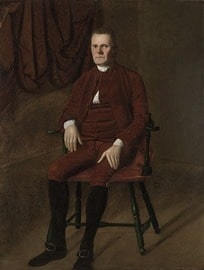Roger Sherman was a native of Newton, Massachusetts. He was born on April 19th, 1721. His father, William Sherman, was a respectable farmer. As a farmer of small means, he could not give his son an education beyond a parochial school.
Early Adulthood
After school, he became a shoemaker apprentice. Because of his thirst for knowledge, Roger Sherman often had an open book on his worktable. He read every moment he could.
When his father died in 1741, Roger became the sole provider for his family. He paid for the college education for his two younger brothers, as well as taking care of his mother until her death.
In 1743 the family moved to New Milford, Connecticut to live near his older brother. He joined his brother in the mercantile business.
Roger Sherman married Elizabeth Hartwell in 1749. They had seven children. After her death in 1760, he married Rebecca Prescot. They had eight children.
Self-taught
Over the next two years, Roger taught himself math and astronomy. He became a county surveyor in 1745. Then in 1748, he wrote the astronomical calculations for an almanac published in New York City for several years. Later, the Connecticut Bar admitted him as an attorney. He eventually became a judge in Litchfield county. Finally, in 1765, he became the treasurer of Yale College, which bestowed on him the honorary degree of Master of Arts.
Political Career
In 1766, Connecticut elected Roger Sherman to the upper house of the colony. Relations between the colonies and Great Britain were tense. Over the next 10 years, Sherman believed independence from the British parliament was the only solution to the rising animosity toward England.
In 1774, Connecticut sent Sherman as a representative to the Continental Congress. Sherman served Connecticut as a member of Congress for the next 19 years until his death in 1793. During his time in Congress, he voted for independence and signed the Declaration of Independence in 1776. He also took part in the writing of the Articles of Confederation and the Constitution of the United States.
Conclusion
Roger Sherman was a pious patriot. After his father’s death, he supported his family financially and spiritually. He led his family in daily devotions and prayer. Sherman also educated himself and worked long hours for the cause of freedom, earning the respect and praise of his countrymen.
